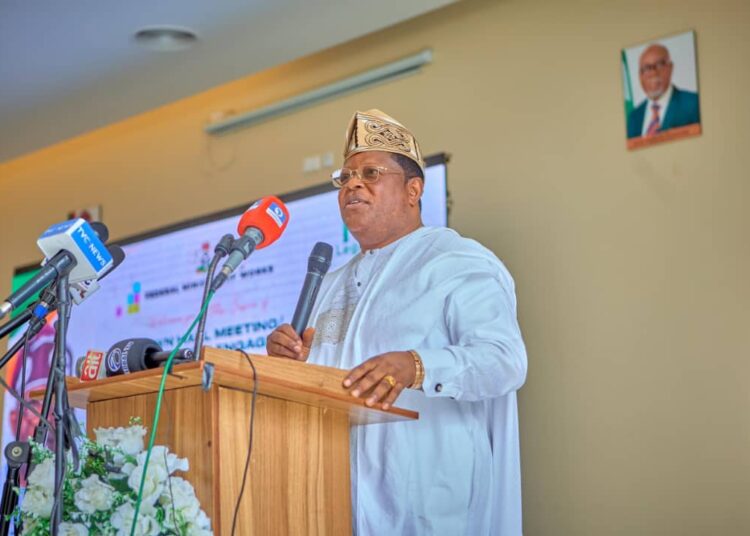A boom in the construction industry, attributed to the federal government’s infrastructure drive, has created more direct and indirect jobs for Nigerians.
LEADERSHIP Weekend gathered that since the President Bola Ahmed administration began its infrastructural renewal initiative, more local and foreign construction companies have been mobilised to various sites nationwide.
Consequently, the companies have engaged more hands and even recalled many old workers, who were disengaged due to a lack of projects.
Although the foreign construction firms were not forthcoming about how many workers they had employed or recalled when contacted about the development, some employees confirmed that their employers had engaged more hands.
One of the workers, who spoke on anonymity because he was not authorised to do so, explained that he was recalled last January, 10 years after he lost his first job.
He said, “I am among the old workers recalled by the management, and since I regained my job, other persons have been employed because we have more projects in various parts of the country. Some state governments have also patronised us with projects.”
It was also learnt that indirect jobs have been created at the project sites as community members, especially food vendors and transporters, benefit from the companies’ presence.
Similarly, the Association of Indigenous Contractors has expressed optimism about reabsorbing some disengaged workers following the government’s simultaneous construction of 2,669 roads across the country.
According to the minister of works, Engr. David Umahi, President Tinubu inherited 2,604 major road projects in 2023 and initiated 65 new major ones.
He said the administration had completed 260 palliative projects initiated in 2023 at the sum of N208 billion.
Umahi said the administration also started four legacy projects across the six geopolitical zones.
“These 2,604 inherited projects totalling about N13 trillion, and, of course, N1 trillion was owed to contractors for completed jobs. With fuel subsidy removal, the projects came to N17-N18 trillion and today’s projection, that is about N20 trillion, but by the ingenuity of the President, he directed that we prioritise these inherited projects along six geopolitical zones. We came up with a total of 440 projects that needed to be reviewed due to economic indices that changed.
“Aside from the projects completed and commissioned, we have also completed another set of 19 projects. Mr President, in 2023, directed immediate action on 260 palliative projects; these projects have been completed up to 99 per cent. These projects are very important; if these palliatives were not fixed, it would have been difficult to move from one state to another. I commend the President for taking on infrastructure projects,” Umahi said at a recent ministerial briefing in Abuja.
The legacy projects, according to the minister, are the Lagos-Calabar Coastal Highway – 700 kilometres; Sokoto (Ilelah) – Badagry (Lagos) – 1,068 kilometres; Abakaliki (Ebonyi State) – Abuja (FCT) with a spur to Calabar (Cross River State) – 474 kilometres and Akwanga (Nasarawa State) – Jos (Plateau State) – Bauchi – Gombe – 420 kilometres.
In an interview with LEADERSHIP Weekend, the secretary-general of the Association of Indigenous Contractors, HRM Muyiwa Ibeun, said the priority given to indigenous contractors by the present administration would provide jobs for the earlier disengaged workers.
According to him, the 2025 budget, when adequately implemented, would re-energise indigenous contractors owing to the pledges and avowed commitment of the Tinubu administration.
He said, “We raised an observation which has been taken into consideration, and that is why we are applauding the minister as well as the President for listening to the indigenous contractors and addressing that challenge. Before now, so many projects were moribund and we suggested to them that they should make provisions for us and that is exactly what they are doing now.”
He also applauded the government for allocating funds to complete the abandoned projects.
Ibeun said the administration had also prioritised indigenous contractors in the ministry’s consideration of projects.
“So, from the indigenous contractors’ view, they have been listening to us, and I think it’s a step in the right direction. All that’s required is for them to commit more funds to the sector. We believe that once the 2025 budget is fully implemented, it will significantly impact the economy, and we will be reabsorbing so many of our staff,” he said.
We’ve got the edge. Get real-time reports, breaking scoops, and exclusive angles delivered straight to your phone. Don’t settle for stale news. Join LEADERSHIP NEWS on WhatsApp for 24/7 updates →
Join Our WhatsApp Channel










